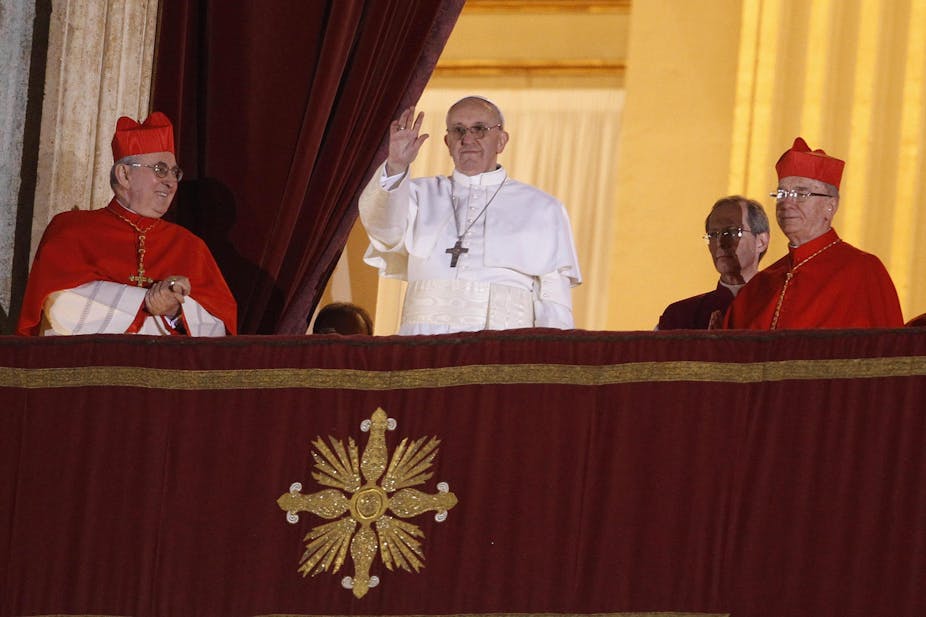Today Australia woke up to its first Latin American and Jesuit pope. Although apparently being second choice behind the former pope Benedict when he was elected in 2005, Pope Francis I was seen as an outside chance this time round.
Argentine Cardinal Jorge Mario Bergoglio, the archbishop of Buenos Aires, comes from the region with the most Catholics in the world.
There seems to be no doubt that he is austere, doctrinally solid, and with a proven track record in Church governance as Jesuit provincial, then auxiliary bishop and Cardinal Archbishop of Buenos Aires. Locally, the Argentine media speak of him with some respect due to his hard work with the poor, and consider him a strong social leader in a nation where politicians and other leaders are often regarded, possibly rightly so, in bad stead.
But there is very little on the public record about the man who now holds the Catholic Church’s highest post. It has been said he is modest, and prefers the local colectivos and trains in his travels to visit the large poor population of his diocese of more than 3 million people.
Yet it is his ties to the military dictatorship in Argentina that raises many questions both for Argentines and human rights campaigners globally. Argentina’s famous human rights campaigners the Madres de Plaza de Mayo have come out immediately condemning the appointment of this Pope.
The Catholic Church has a strong link to the darkest days in Argentine history: the period between 1976-1983 which saw the bloody repression of anyone considered subversive. Torture and killing was routine. In a damning book by journalist Horacio Verbitsky, El Silencio (Silence), he tells of how then Cardinal Jorge Bergoglio hid the dictatorship’s political prisoners from a delegation of the Inter-American Human Rights Commission.
And while many of his fellow Jesuits in the region have followed a more progressive line of liberation theology, Francis has not. He was prominent in the church during the brutal dictatorship of the 1970s, in which more than 30,000 people “disappeared”. He has been photographed with Jorge Videla, the military leader of the time. The Catholic Church in Argentina has long held very conservative tendencies but there were members of the Jesuit order who were involved in the “theology of liberation” and opposed the military government. Bergoglio was not. “After a war,” he was heard to say, “you have to act firmly.”
Argentine papers have reported that he was accused of having withdrawn his protection of two of his fellow Jesuits during the military dictatorship. Bergoglio said that shortly before the coup on March 24, 1976 he warned them of the danger and gave them both shelter in the house of the Jesuits.
But the two priests, Francisco Jalic and Orlando Dorio, who did social work in poor neighbourhoods of Buenos Aires, rejected this offer, according to Bergoglio. Two months later they were abducted by the military and held prisoner for five months in a secret detention centre.
Politically, Francis I is no friend of the left and was been a vocal critic of centre-left former president Nestor Kirchner and current president Cristina Fernandez de Kirchner. He clashed with both on issues around gay marriage (which is legal in Argentina) and Fernandez de Kirchner has famously been absent at his public speeches, as often they were directed at her.
In 2010, he led the fight of what the archbishop called a “war of God” against the government, while trying by all means to prevent the passage of the law recognising marriage between same sex couples. Bergoglio led demonstrations, mobilised priests in defense of the “family unit” and called for vigils outside parliament. “This is not just a political struggle, but it is a destructive claim to God’s plan,” he said.
After being repeatedly shunned by the government, Bergoglio has stated there is no relation between the church and the government in Argentina. Politically, he could be identified with the Peronist right in Argentina. He is a critic of free market neo-liberalism, but with authoritarian and socially conservative tendencies.
The decision by the Catholic hierarchy to move the centre of gravity away from Europe for the first time is an interesting one. Nonetheless, Bergoglio has strong connections to Italy – his parents were Italian – and the conservative wing of the Catholic Church, so the choice to move geographically may not be as much of a leap as it appears. Brazilian candidate Odilo Scherer would have been a more “centrist” candidate who has a cleaner human rights record.
But without a doubt, the appointment of a Latin American Pope will put some of the pressing issues of an oft forgotten region - such as chronic poverty and inequality under an devastating global capitalist system - on the table.

